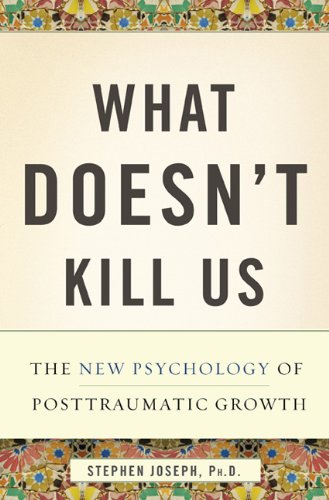What Doesn't Kill Us: The New Psychology of Posttraumatic Growth

“What Doesn’t Kill Us is accessible for all readers, . . . Well worth the time to read, digest, and utilize in one’s daily life.”
“Ordinary people have the power to live lives just as dramatic and driven as those of superheroes, overcoming traumas no less daunting.” So claims Dr. Joseph, who uses part of Nietzsche’s time-tested phrase “What doesn’t kill me makes me stronger” as part of the book’s title. His experience, research, and writing back up this proclamation and provide perspective and hope for everyone who has, is or will, experience a traumatic event(s) in their life. That includes about 75% of humanity who must face some form of trauma during their lifetime.
Professor Joseph starts out with a little perspective and history of the term “Posttraumatic Growth,” which was coined in the mid-1990s by clinical researchers Professors Richard Tedeschi and Lawrence Calhoun and is in line with many philosophers’ adages about how to live a “good life” and adapt to and live with loss and trauma. The insight and compassion of holocaust survivor, philosopher, and psychologist Viktor Frankl, is also sprinkled throughout the manuscript in support of the author’s thoughts, case studies and perspectives.
The three existential themes at the core of posttraumatic growth are described as: 1) Recognition that life is uncertain and changes; 2) Psychological mindfulness or how one’s thoughts, emotions, and behaviors are related to one another and 3) Acknowledging personal agency or responsibility for choices one makes.
Dr. Joseph says, “Trauma leads to an awareness of all three of these existential truths.” It might be added that they “can” lead to such awareness, but such awareness does not always take place. He also shares three commonly related aspects of post-traumatic growth, which include personal, philosophical and relational changes and provides examples and case studies of each.
Trauma is taken from the Greek word, which means wound. Our physical wounds are dressed, stitched and/or removed. In the chapter titled The Biology of Trauma, Mr. Joseph shows how our emotional wounds are interconnected with our bodies’ autonomic nervous system and not so outwardly apparent or as easy to fix. “Most of the time our assumptions serve us well,” he says, “but throughout life we are always making revisions to them.” Never is this more apparent than after one has had a traumatic event assault their body, heart and mind.
He also points out that not everyone who experiences post-traumatic stress (PTS) develops Post Traumatic Stress Disorder (PTSD), as many have been led to believe. This is discussed throughout the book and is an important factor to consider for both survivors and those providing them support.
What Doesn’t Kill Us provides an excellent description of methods of coping (approach-oriented and avoidance-oriented) and how each can be constructively utilized at different times, as well as both components of approach-oriented coping (task-focused and emotion-focused). Finding meaning from events is human nature, as is avoiding painful stimuli.
Post-traumatic stress is a reality, as is the fact that it can also be the trigger or catalyst for post-traumatic growth. At some point, survivors of trauma must take responsibility for the choices they make in how they respond to trauma and what they decide to do from then on. Being able to adapt, stretch, bend and change is difficult for many of us at any given time, let alone following a traumatic event(s), but it is vital. As Dr. Joseph states, “The key to successful coping is ultimately flexibility.”
What Doesn’t Kill Us is accessible for all readers, with a slant toward those in the helping and healing professions. It isn’t too thick (in length or subject matter); condenses the latest research into bite size portions; and provides helpful and practical tools for ways to view trauma as a catalyst for growth and positive change, without being preachy, dogmatic or too theoretical. Well worth the time to read, digest, and utilize in one’s daily life.